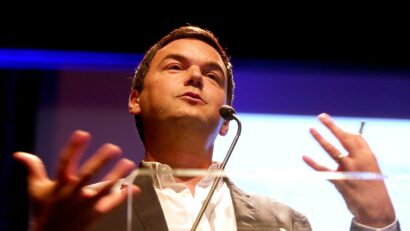
Fairer Taxes and Inheritance for all: The economic Plans of Star Economist Piketty
Thomas Piketty is probably the best-known economist of our time. In his works, he presents proposals on how we can make our economy and society fairer and more democratic. Pikettys economic plans include more economic co-determination, fairer taxes and a stronger welfare state. We have collected his most important demands and show what he stands for.
DISTRIBUTING PROSPERITY MORE FAIRLY
The entire history of mankind is characterized by great inequality. A few people own the majority of the wealth, the rest share what remains. This small group of people is not only extremely wealthy, but also largely controls politics and the economy. Star economist Thomas Piketty wants to change this. He has developed reform proposals that distribute the wealth of our society more fairly and make our lives more democratic. The most important pillars of his reforms are economic co-determination, fairer taxes and a stronger welfare state.
[embedded content]
PROFIT INTERESTS USUALLY DECISIVE IN THE WORKPLACE
We spend a large part of our lives at work. While we make democratic decisions in almost all areas of life, there is hardly a trace of democracy in the workplace. In almost all companies, the owners alone make the decisions and employees have to follow suit. At most, they have a say. This is a particular problem because owners and employees often have completely different interests. The workforce wants good, stable jobs that will enable them to provide for themselves and their loved ones in the long term. Owners are primarily interested in profits. Everything else is secondary.
This contrast is particularly extreme in the case of large stock corporations. Shareholders are rarely involved in the work of the company and are often scattered all over the world. Their interest in the company is limited to how much money they can make with their shares.
MORE CO-DETERMINATION CAN MAKE COMPANIES MORE SUCCESSFUL
Piketty wants employees to have a say in their company. They should have half of all voting rights in large companies. If the owners want to change something in the company, they must therefore negotiate with the workforce. If the workforce has new ideas, they can push them through with the support of one vote from the owners. Piketty argues as follows:
Nothing guarantees, for example, that shareholders are more likely than employees to be able to manage a company or invest more in the economic project in the long term. Often enough, the opposite is true: an investment fund can get in and out of the company in the short term, while the employees have generally invested a significant part of their lives, energy, knowledge and skills in it.
In addition, unlike shareholders, employees often live in the vicinity of the company. If the company operates in an environmentally damaging way or if many employees suddenly resign, this has a direct effect on the lives of the employees, but hardly on the lives of the shareholders.
In working life today, those who have money decide, and the rest must follow. Piketty wants to democratize our working world. This should mean that our economy is not exclusively geared towards the profit interests of a few entrepreneurs, but towards the well-being of the entire population. With half of the voting rights, employees could ensure that the focus of their company is on the well-being of employees and local residents as well as the long-term positive development of the company, rather than just profits for owners.
THE BIGGER THE COMPANY, THE MORE DEMOCRACY
How voting rights are distributed in a company should, however, depend on the size of the company. Piketty’s principle here is: The more people work in a company, the more people need to be involved in decision-making. Let’s look at this using an example:
If a company has, say, fewer than 10 employees, the owner(s) can make all decisions alone. Only from the 10th employee onwards do the employees have half of the voting rights. From then on, the owner needs the support of at least one employee to make major decisions.
STRONGER WELFARE STATE INCREASES QUALITY OF LIFE
For Thomas Piketty, the welfare state is one of humanity’s greatest achievements. Free healthcare has caused our life expectancy to explode, free education has led to better technologies and products as well as more self-determination, and collective agreements and minimum wages guarantee that people no longer have to toil for a pittance.
Piketty wants to further expand these social achievements in order to reduce inequality and improve people’s quality of life.
ALL CHILDREN HAVE A RIGHT TO EQUAL EDUCATION
For Piketty, education is the basis for equality. Therefore, one of his most important demands is that all pupils have access to a well-funded public education system and that resources in the education system are distributed fairly.
Piketty criticizes countries such as the USA, where private schools and private universities play a central role, but also shows that in Europe education depends on income.
Using France as an example, he explains that the state spends three times as much on pupils who attend the country’s best educational institutions as it does on pupils who attend financially disadvantaged schools.
However, elite schools are often attended by the children of wealthy families, while children from low-income families often end up at disadvantaged schools. This further increases social inequality. Children from rich families benefit from the best public education, while children from poorer families receive a much poorer education.
This should change. The star economist is calling for “all children to be entitled to the same education spending”. State investment in the education system should not only be increased, but also redistributed. Instead of providing particularly strong support for children from wealthy families, schools with children from low-income families should receive more funding.
ALL PEOPLE HAVE A RIGHT TO A BASIC INCOME AND A JOB
The star economist also calls for everyone to have the right to a basic income that guarantees their livelihood. Although there are already programs in many countries, such as the minimum income in Austria, Piketty proposes reforms in this area. Everyone should be entitled to this basic income, including students and the homeless. In addition, people with an income below the basic income should automatically be topped up to this level without having to apply.
Piketty also advocates a state employment guarantee. Every person who cannot find a job on the labor market would be allocated a position in the public or charitable sector. The aim here is not to pay a pittance, but a decent wage with which employees can make a living.
A BASIC INHERITANCE FOR ALL
Inheritances are extremely unequally distributed. While the majority of Austrians inherit little to nothing, the richest people in the country have mostly received their wealth from mom and dad. Piketty wants to democratize inheritance. In concrete terms, this means that everyone receives an unconditional basic inheritance on their 25th birthday. This inheritance should amount to 60 percent of a country’s average wealth. In Austria, that would be around 120,000 euros. This basic inheritance is to be financed by taxes on large inheritances and assets.
This basic inheritance is intended to guarantee young people an easier start to adult life. They could use it to finance the down payment on an apartment or start a business, for example. When asked whether young people would not simply squander this gift of money, the economist replies:
“This can happen to rich people as well as poor people. I don’t believe that the children of millionaires only do clever things with their money. Rather the opposite.”
LIMITING PARTY DONATIONS
In order to protect our democracy, Piketty believes that the financing of political parties must be completely reformed. Today, corporations and the super-rich can buy political influence through party donations. We saw this in Austria under former Federal Chancellor Kurz.
Piketty wants a “total ban on all party donations from companies or other corporations” in conjunction with “a radical cap on donations and contributions from private individuals”. Private individuals should only be allowed to donate a few hundred euros per year to political parties. Instead, every citizen should have a certain quota of state funding at their disposal, which they can allocate to parties or political movements.
PIKETTYS ECONOMIC PLANS: WEALTH AND INHERITANCE TAX SHOULD FINANCE REFORMS
But how does Piketty want to finance all these reforms? By changing the tax system. The two basic ideas: the tax system should be simplified and the richest should be asked to pay more so that the majority of society can be relieved.
The basic elements of this are the introduction of a wealth and inheritance tax and a more progressive income tax. In addition, a progressive CO2 tax should be introduced and indirect taxes such as VAT should be abolished.
For Piketty, wealth and inheritance taxes are a key tool for achieving a fairer society. Austria does not have either of these taxes, although the vast majority of the population would be in favor of their introduction.
[embedded content]
Piketty’s concept of inheritance tax works similarly to that of income tax. Small and medium-sized inheritances should be taxed little or not at all. The higher the inheritance, the larger the share that has to be shared with the public.
In contrast to inheritance tax, which is only levied once, wealth tax is an annual tax. For taxes below the average wealth, an annual tax of 0.1 percent is levied. Similar to income tax and inheritance tax, wealth tax also increases with the amount of wealth. At 2 times the average wealth, the tax is 1 percent, 10 percent at 100 times, 60 percent at 1,000 times and 90 percent at 10,000 times.
To fall into the highest tax bracket here, you need assets of 2 billion euros. This top tax rate would only affect around the richest 20 Austrians.
LARGE INCOMES TAXED MORE HEAVILY
Even today, large incomes are taxed more heavily than small incomes in most countries. While top tax rates today are around 50 percent, they were significantly higher in almost all industrialized nations until the 1980s, reaching over 80 percent in the USA and the UK, for example. Since then, taxes have been cut for the rich and an ever greater proportion of the tax burden has been borne by small and middle incomes.
Piketty wants to reverse this trend and make the richest people pay more tax again. People whose income is around 10 times higher than the average income should pay between 60 and 70 percent income tax. Incomes that are 100 times higher than the average should be taxed at 80 to 90 percent.
INDIRECT TAXES ONLY WITH A STEERING EFFECT
In Piketty’s view, indirect taxes have no real justification unless they are intended to correct negative behavior. Accordingly, taxes such as a tobacco tax would be justified, but VAT would not.
The consumption of tobacco has serious health effects and causes enormous costs in the healthcare system. A tobacco tax makes cigarettes expensive. This is intended to discourage people from consuming tobacco. So there is a steering effect here.
This steering effect does not exist with VAT, for example. Whether staple foods such as bread or potatoes are taxed will make little difference to whether I buy these foods or not. They are essential for survival. So there is no steering effect here.
VAT in particular is an enormous burden for low-income households. Abolishing it would help these people in particular.
CO2 TAX SHOULD PARTICULARLY AFFECT THE SUPER-RICH
An indirect tax that is central to Piketty’s economic model is the CO2 tax. Unlike most current CO2 taxes, however, Thomas Piketty calls for a progressive CO2 tax. This means that the more CO2 a person consumes, the higher the tax rate at which consumption is taxed.
Data shows that a large proportion of CO2 emissions can be attributed to a relatively small group of super-rich people. This progressive CO2 tax would primarily affect this group.
The money raised from this tax will be used to support low- and middle-income households to switch to sustainable energy.
PARTICIPATORY SOCIALISM
Thomas Piketty calls his economic model participatory socialism. His demands are intended to ensure that it is not the richest in our society who call the shots, but that we all have an equal say in the direction in which our country and our world should develop.
The star economist takes up many of the demands already propagated by great social democrats such as Bruno Kreisky, Willy Brandt and Olof Palme. However, he modernizes them and goes one step further. His reforms would create a level of social equality and justice that has never been seen before, and guarantee that democracy permeates all areas of our lives and does not stop at the office door.
We must flood all areas of society with democracy. – Bruno Kreisky, former Chancellor of Austria
Who is Thomas Piketty?
Thomas Piketty received his doctorate in economics at the age of 22 and became a professor at the Massachusetts Institute of Technology at the age of 26. He is the founding director of the Paris School of Economics and also works at the École des Hautes Études en Sciences Sociales (EHESS). His research focuses on social inequality and the question of how we can create a fairer economic order. In 2014, Piketty published Capital in the 21st Century, which brought him worldwide fame.
This work is licensed under the Creative Common License. It can be republished for free, either translated or in the original language. In both cases, please cite www.Kontrast.at / Thomas Hackl as the original source/author and set a link to this article on Scoop.me. https://scoop.me/piketty-economic-plans/
The rights to the content remain with the original publisher. Läs mer…

